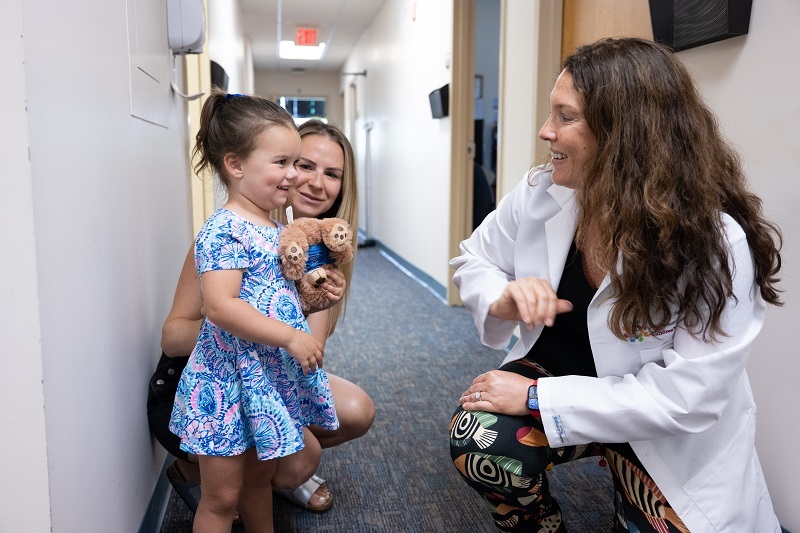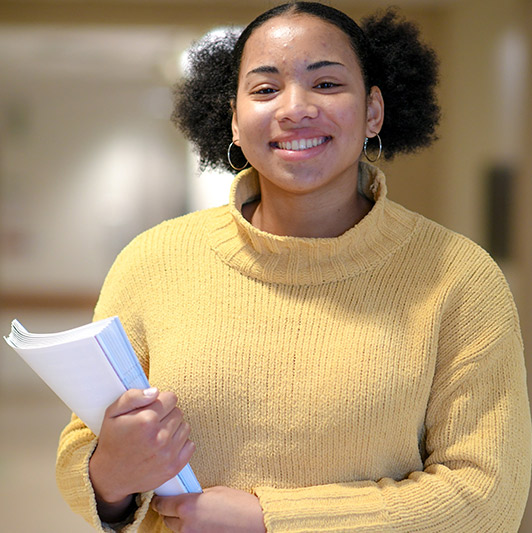Toddler Bounces Back After Robotic Surgery for Kidney Blockage

September 12, 2023
Just before her second birthday, Maggie Hennessey developed a high fever with no other symptoms. After a few days with no improvement, her mom, Rachel, took her to the pediatrician, who diagnosed her with a urinary tract infection (UTI) and put her on antibiotics.
Soon Maggie was on the mend. But concerned that Maggie might have urinary reflux (a condition in which urine flows backward from the bladder to one or both ureters and sometimes the kidneys), her pediatrician referred her to pediatric urologist Kristin Kozakowski, M.D., at K. Hovnanian Children’s Hospital at Jersey Shore University Medical Center.
Dr. Kozakowski ordered an ultrasound, which showed that Maggie’s left kidney was abnormal with minor hydronephrosis, a condition where the kidney swells because of a build-up of urine. “That can signify that there is either a blockage or that the urine is refluxing back up, but you can't tell from the ultrasound,” says Dr. Kozakowski. “A lot of times kids have infections and the kidneys look perfectly fine, but with Maggie, there actually was a problem with her kidney.”
Rachel was in total shock. Since she was a baby, Maggie had seen a gastroenterologist for dairy intolerance and acid reflux, but this news seemed to come out of left field. “I didn't think much was going to come of this appointment,” she says. “I was just going to cross my Ts and dot my Is.”
Suspecting Maggie had vesicoureteralreflux, which can increase the risk for recurring UTIs, Dr. Kozakowski put her on antibiotics and ordered two more tests: a renal scan to test the function of the kidney and an x-ray series of the bladder and urethra.
A Surprising Diagnosis
Before the tests could be completed, Maggie was sick again. This time she didn’t improve with oral antibiotics and her fever kept going up. She was admitted to the Children’s Hospital for IV antibiotics.
It was a difficult time for Maggie and her mom. “I was super emotional because we didn't know what the heck was going on. But the support staff and nurses were really great, and we felt like we were in a good place,” Rachel says.
After five days in the hospital, Maggie was well enough to go home.
After Maggie was released from the hospital, a series of scans showed that she didn’t have urinary reflux but rather a blockage in the kidney called ureteropelvic junction (UPJ) obstruction.
“Usually, kids with an obstructed kidney do not present with urinary infections, so I was really surprised. They tend to have pain or vomiting and have severe hydronephrosis,” Dr. Kozakowski says.
Dr. Kozakowski recommended they monitor her with ultrasounds every three months, a common approach to take a first for patients with UPJ. But after a few months later, Maggie started experiencing stomach pain and vomiting, the ultrasounds showed that her kidney was getting worse.
Dr. Kozakowski and Maggie’s parents agreed it was time to fix the blockage. Surgery was done robotically, which meant that Maggie only needed a few small incisions. She stayed in the hospital for one night—asking for french fries soon after surgery—and was back to herself in no time. The hardest part of recovery, says Rachel, was stopping her from running and jumping for the first two weeks.
In Good Hands
Maggie’s parents are incredibly grateful for the care she has received from Dr. Kozakowski and the care team. “Dr. Kozakowski was amazing right away, and that helped us get through this. I could talk to her, and I never felt rushed. We felt like Maggie was in good hands,” Rachel says.
Not only has Maggie’s kidney blockage been fixed, but she also hasn’t had any stomach pain or vomiting since surgery—suggesting that some of her GI issues were actually a symptom of the kidney blockage.
“Sometimes kids don't find out they have this until they're a teenager, and it's a much bigger deal then. I feel really lucky that we found out so soon in her life and had it fixed,” Rachel says. “The UTI helped us out because, otherwise, who knows when we would have found out.”
Next Steps & Resources:
- Meet our source: Kristin Kozakowski, M.D.
- To make an appointment with a pediatric urologist or nephrologist near you, call 800-822-8905 or visit our website.
- Learn more about our pediatric urology services.
The material provided through HealthU is intended to be used as general information only and should not replace the advice of your physician. Always consult your physician for individual care.






